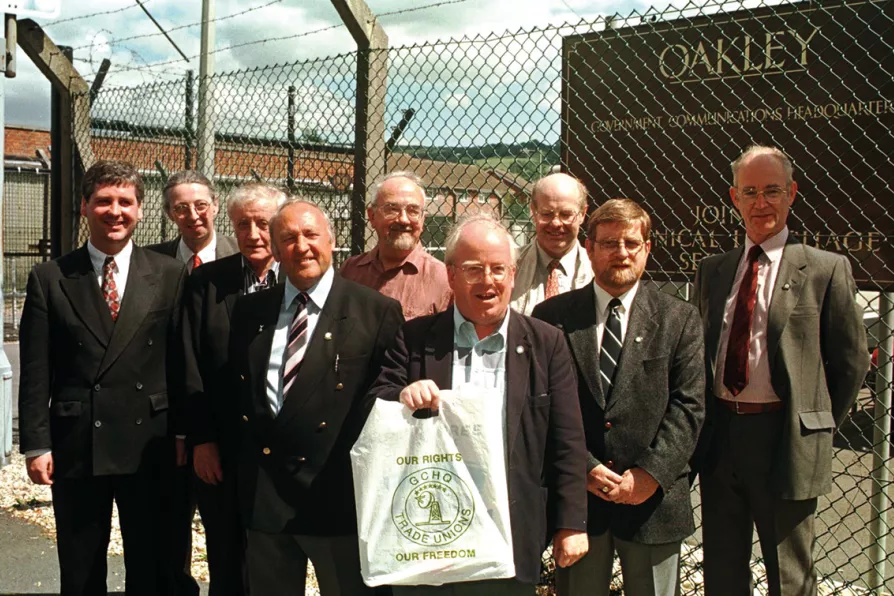RAMZY BAROUD offers six reasons why Netanyahu is prolonging conflict in the Middle East

 VINDICATED: Mike Grindley (centre) holds up his famous
bag before making a symbolic return to the GCHQ site with
other sacked colleagues, July 1997
VINDICATED: Mike Grindley (centre) holds up his famous
bag before making a symbolic return to the GCHQ site with
other sacked colleagues, July 1997
MANY seek prominence, others have it thrust upon them. Mike Grindley, who died aged 85 in hospital on New Year’s Day following a stroke, was definitely one of the latter.
Humble and kind, Grindley had been beavering away as a Chinese linguist in the still very secret GCHQ since 1961 when, in January 1984, a rampant Margaret Thatcher sought to ban trade unions, saying it was “a conflict of loyalties” to be a member of a trade union and work for GCHQ.
On January 25 1984 all staff were given an ultimatum of leaving the union or facing the sack. The public and political response to the announcement was massive, with the TUC calling a day of action and even the EETPU, the right-wing led electricians union, threatening to go on strike if there were sackings.
Despite the unions giving commitments to protect national security and a High Court ruling in the unions’ favour, Thatcher was not for turning and the ban was implemented on March 1 — with the House of Lords overturning the High Court decision on grounds of “national security.”
In the ensuing campaign, Grindley became chair of GCHQ trade unions, representing union members from a small office in Cheltenham. Following its election victory in 1987, the Tory government were confident enough to proceed with its long-threatened sackings of the remaining trade unionists. These began on November 14 1988 and in the end, Grindley was sacked along with 13 other trade unionists.
For Grindley, it was a moral issue. At a rally in London’s Central Hall held in protest against the sackings, Grindley let loose his feelings: “We resent utterly and completely the accusations that the trade unions we are proud to belong to are any threat to national security … The traitors come from the old-boy network or elsewhere. No government has the right to say to its employees that your democratic rights have been removed.”
Over the next decade, Grindley became the symbol of the campaign, speaking at trade union conferences, Tolpuddle and the annual January rallies in Cheltenham. He became famous — not least for the ever-faithful GCHQ trade unions carrier bag he had with him on all occasions and, to cheers, held up when he finished speaking.
Not only did he promote the GCHQ cause, but he also took solidarity to other workers in dispute — to Wapping, Silent Night, P&O and many others. Proud of his Irish heritage, he established and kept strong links with many Irish trade unions.
The GCHQ dispute is still highly relevant today. It was clear the Tory government was intent on banning unions not only in GCHQ but in other areas of government and limiting rights to strike in essential services. The response and the difficulty in implementing the ban in GCHQ effectively blocked the avalanche of union attacks envisaged by the Tories.
This was done through the enduring commitment of the sacked workers supported by the Civil Service unions and the collective and united response of the wider trade union movement here and abroad.
Wherever Thatcher went across the international stage she was hounded about GCHQ and her hypocrisy in criticising other governments over human rights. The campaign is a valuable lesson and example for trade unionists today facing similar threats in the wake of the growing number of industrial disputes.
His proudest moment came in August 1997 when Robin Cook honoured an oft-repeated Labour Party pledge to restore trade unions in GCHQ. Marching, fist clenched with his GCHQ trade union plastic bag in hand — he led the sacked unionists back through the gates into GCHQ.
This success came about in no small part due to Grindley’s willingness to make a life-changing commitment to campaigning for what he believed in — the right to belong to a union.
Grindley remained the custodian of the campaign and was planning how the 40th anniversary of the ban should be marked in 2024 — keen that an important trade union victory should be properly remembered. He is survived by the three children of the marriage to his beloved Isabel — Helen, Tim and Neil — and his sister Biff.

LYNNE WALSH tells the story of the extraordinary race against time to ensure London’s memorial to the International Brigades got built – as activists gather next week to celebrate the monument’s 40th anniversary













